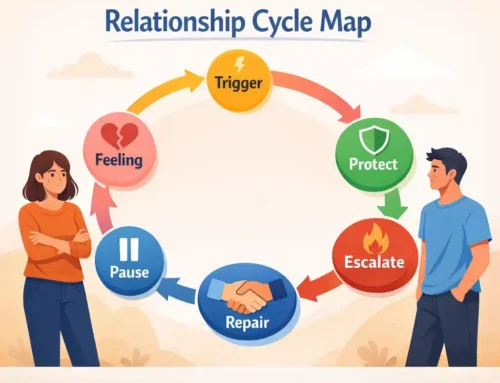
Approx. read time: 5.3 min.
Post: Reconnecting Body and Mind After Prolonged Stress: Finding Your Way Back to Balance
Prolonged stress can create a profound sense of disconnection between the body and mind. This disconnection often manifests as fatigue, lack of motivation, physical discomfort, or even emotional numbness. Stress pushes the body into survival mode, disconnecting it from the signals that guide well-being and self-awareness. When this disconnect becomes chronic, it can affect mental clarity, emotional health, and physical vitality.
This article explores why stress causes a rift between the body and mind, the signs to look out for, and actionable strategies to reconnect with yourself and restore balance.
The Impact of Prolonged Stress on the Body-Mind Connection
Stress is the body’s natural response to perceived threats. It activates the sympathetic nervous system, releasing hormones like cortisol and adrenaline that prepare the body for action. While this “fight-or-flight” response is essential in short-term situations, prolonged activation can overwhelm the system, leading to exhaustion.
Signs of Disconnection
- Physical Symptoms:
- Persistent fatigue
- Muscle tension or pain
- Digestive issues
- Frequent headaches or migraines
- Mental and Emotional Symptoms:
- Difficulty concentrating
- Emotional numbness or detachment
- Heightened anxiety or irritability
- Feeling “out of control” or disconnected from reality
- Behavioral Symptoms:
- Avoidance of social interactions
- Poor sleep or insomnia
- Over-reliance on distractions (e.g., social media, TV, substances)
These symptoms indicate a misalignment between the body’s needs and the mind’s demands.
Why Stress Causes a Body-Mind Rift
Prolonged stress often forces individuals to ignore their physical and emotional needs to meet external demands. This suppression builds a disconnection between the signals from the body and the mind’s focus. For example:
- Ignoring hunger cues to work late.
- Pushing through exhaustion for productivity.
- Suppressing emotional distress to “stay strong.”
Over time, this pattern teaches the brain to tune out the body, leaving individuals feeling detached and unaware of their needs.
How to Reconnect with Your Body and Mind
Rebuilding the connection between the body and mind requires intentional effort, patience, and self-compassion. Here are proven strategies to help you find your way back to balance:
1. Mindful Awareness: Reclaiming the Present Moment
Mindfulness helps quiet the mental chatter of stress and brings focus to the body’s signals.
- Practice Body Scans: Spend 5–10 minutes daily focusing on each part of your body, noting areas of tension or discomfort without judgment.
- Meditation: Guided meditations that emphasize breathing and bodily awareness can strengthen the body-mind connection.
- Mindful Movement: Activities like yoga, Tai Chi, or simple stretching routines align physical movement with mental awareness.
2. Restore Your Nervous System: The Power of Relaxation
Chronic stress overactivates the sympathetic nervous system, so activating the parasympathetic nervous system (responsible for “rest and digest”) is essential.
- Deep Breathing Exercises:
- Practice diaphragmatic breathing: Inhale deeply for 4 seconds, hold for 4 seconds, and exhale slowly for 6 seconds.
- This calms the nervous system and fosters a sense of safety in your body.
- Progressive Muscle Relaxation: Gradually tense and relax each muscle group, starting from your toes and working upward.
3. Listen to Your Body Through Movement
Engaging in physical activity can ground you in your body and release pent-up stress.
- Low-Impact Activities: Walking, swimming, or cycling are excellent ways to gently reconnect with your body.
- Expressive Movement: Dance, stretch, or simply move in ways that feel good to you without worrying about structure or form.
- Strength Training: Lifting weights or doing resistance exercises can rebuild a sense of power and control in your body.
4. Nourish Your Body With Care
Stress often disrupts eating patterns, which can exacerbate feelings of disconnection.
- Eat Intuitively: Pay attention to hunger and fullness cues. Choose foods that nourish your body and mind without attaching guilt to eating.
- Hydration: Dehydration can increase fatigue and reduce mental clarity, so aim for consistent water intake throughout the day.
- Supplements: If stress has depleted your body’s resources, consider vitamins like magnesium or omega-3s after consulting with a healthcare provider.
5. Create a Routine That Honors Rest
A consistent routine helps signal to your body and mind that it is safe to relax.
- Sleep Hygiene: Establish a wind-down ritual at night, such as dimming lights, journaling, or meditating.
- Scheduled Breaks: During the day, take regular breaks to stretch, breathe, or step outside for fresh air.
- Digital Detox: Limit screen time, especially before bed, to reduce overstimulation and anxiety.
6. Reconnect Emotionally
Stress often suppresses emotional awareness, making it vital to process feelings constructively.
- Journaling: Write about your thoughts and feelings daily to explore and release emotional stress.
- Therapy: Speaking with a counselor or therapist can help you unpack complex emotions and develop coping strategies.
- Creative Outlets: Painting, music, or crafting can provide a safe space for emotional expression.
7. Rebuild Self-Trust Through Small Commitments
Prolonged stress may erode your trust in yourself to meet your needs. Rebuild it gradually.
- Set Small Goals: Commit to simple acts like drinking a glass of water in the morning or taking a 10-minute walk.
- Celebrate Successes: Acknowledge even the smallest achievements to foster self-confidence.
The Role of Social Support
Isolation often deepens the body-mind disconnect. Reaching out to trusted friends, family, or support groups can help you feel seen and understood. Sharing your experiences and hearing others’ perspectives can remind you that you are not alone.
When to Seek Professional Help
If the disconnection persists or significantly impacts your quality of life, consider seeking professional guidance. Therapists, bodywork practitioners, and holistic health professionals can provide tailored interventions to help you reconnect with your body and mind.
Therapeutic Approaches:
- Somatic Therapy: Focuses on integrating bodily awareness into the healing process.
- Cognitive-Behavioral Therapy (CBT): Helps reframe stress-inducing thought patterns.
- Massage or Acupuncture: Releases physical tension and promotes relaxation.
Conclusion: A Journey, Not a Destination
Reconnecting with your body and mind after prolonged stress is not an overnight process. It requires patience, intentionality, and self-compassion. By practicing mindfulness, listening to your body’s needs, and seeking support when necessary, you can rebuild the harmony between your body and mind.
Remember: small, consistent steps toward self-awareness and care can lead to profound changes over time. You are not broken—your connection is simply waiting to be rebuilt.










